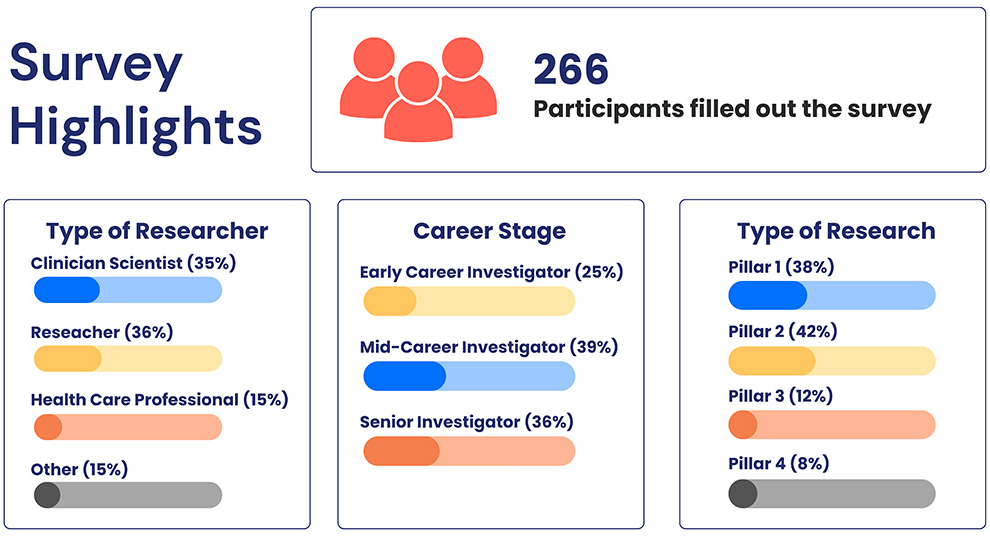Knowledge Exchange Tour: What we Heard Report
Introduction: Setting the stage for the CIHR Institute of Circulatory and Respiratory Health (ICRH) 2024–2034 Institute Research Priority Plan (IRPP)
Through a pan-Canadian Knowledge Exchange Tour (KET), the CIHR Institute of Circulatory and Respiratory Health (ICRH) engaged with health research communities, partner organizations, patients, clinicians and policy leaders. Reflecting the needs and insights of people across the country, their input helped shape ICRH's new Institute Research Priority Plan (IRPP).
Between fall 2024 and spring 2025, ICRH held in-person townhalls, roundtables and virtual meetings with approximately 300 members of the scientific community across the country. In collaboration with the MP Advisory Group (MPAG), ICRH also conducted 13 key informant interviews with key representatives from organizations working within ICRH's mandate areas.

Long description
A map of Canada with the title “Knowledge Exchange Tour Across Canada” in dark blue text on the left. The map highlights ten cities across the country, each labeled in a colored box with connecting lines: Vancouver (lime green), Edmonton (dark green), Calgary (light blue), Blue Mountain (dark blue), London (purple), Hamilton (violet), Toronto (pink), Ottawa (red), Montreal (orange), Québec (yellow-orange), and Halifax (yellow). The background has a gradient from light green on the left to light blue on the right.
Additionally, ICRH conducted an online survey to gain deeper insights and identify emerging research priorities and gaps. 266 participants from the research community, health care professionals and other groups provided feedback. Participants surveyed represent a diverse group across disciplines and career stages.

Long description
Please note that the percentages are approximate and may not total 100% as participants could select multiple responses.
266 participants filled out the survey:
- Type of Researcher:
- 35% Clinician Scientist
- 36% Researcher
- 15% Health Care Professional
- 15% Other
- Career Stage:
- 25% Early Career Investigator
- 39% Mid-career Investigator
- 36% Senior Investigator
- Type of Research:
- 38% Pillar 1 (Biomedical)
- 42% Pillar 2 (Clinical)
- 12% Pillar 3 (Health Services)
- 8% Pillar 4 (Social, Cultural, Environmental and Population Health)
What we Heard: Highlights
The following highlights represent key input from the pan-Canadian Knowledge Exchange Tour, discussions, interviews and survey results.
-
1. Recommendations for Values
89% of survey participants confirmed that the following underlying values driving the ICRH mandate align with their work:
- Science excellence
- Evidence-driven health care decision making
- Patient, family and partner-centred relevance
- Discovery for economic impact
They additionally emphasized the importance of the following values:
Health equity
- Co-design inclusive health research that addresses disparities in underserved, Indigenous, rural and racialized communities, using equity-centred frameworks, gender-based analysis and intersectional approaches throughout all stages of the research process.
Open science
- Advance scientific efficiency, rigour and reproducibility by enhancing access to data and resources, shared research platforms, inclusive governance and transparent methodologies.
Capacity building and mentorship
- Invest in sustained and inclusive support for early-career researchers and clinician scientists across diverse institutions and disciplines to develop the next generation of scientific leaders.
-
2. Recommendations for Research Priorities
Participants identified the following recommendations for the development of ICRH's research priorities:
Prevention, Early Detection and Health Promotion
- Early Detection & Screening: Promote early identification of diseases and screening for preclinical conditions by leveraging digital tools, Artificial Intelligence (AI) and biomarkers for precision prevention.
- Preventive & Community Health Strategies: Advance prevention of cardiovascular and respiratory diseases including through primary care and community-level interventions focused on social determinants of health.
- Integrated Care: Improve integration of health services and transitions in care to support holistic and informed health management across the lifespan.
Basic Research on Disease Processes and Therapeutic Mechanisms
- Blood and Vascular Biology: Deepen our understanding of blood and plasma science, transfusion safety and endothelial replacement and investigate mechanisms of vascular permeability, thrombosis and antithrombotic drug development, including for stroke and peripheral arterial disease.
- Cardiovascular Health: Explore heart failure, arrhythmias, sudden cardiac arrest, hypertension and cardiometabolic risk in aging populations, with a focus on personalized medicine, cardiac regeneration and sex-specific cardiovascular differences.
- Respiratory Health: Advance early detection and treatment of airway diseases such as asthma and bronchiectasis, impacts of vaping and pollution and climate-related respiratory challenges.
- Sleep Health: Investigate sleep apnea, insomnia and sleep-related breathing disorders, including their links to stroke and cancer.
- Sepsis & Critical Care: Investigate sepsis pathophysiology, post-sepsis syndrome, ventilator weaning, emergency care optimization and resuscitation techniques.
- Pediatric & Congenital Health: Improve pediatric heart health, congenital disease management and blood pressure screening, with a focus on long-term outcomes.
- Immunology & Inflammation: Study immune modulation to prevent major diseases, the role of immune cells in hypertension and contribution to chronic disease and organ damage.
- Technological & Molecular Innovation: Apply single-cell proteomics, spatial technologies, genomics and advanced bronchoscopy to phenotype diseases and guide precision therapies.
Precision, Personalized and Data-Driven Medicine
- Personalized & Data-Driven Care: Develop individualized care pathways for precision health across the lifespan by integrating omics, cognitive, functional, environmental and socioeconomic data.
- Early Intervention & Smart Monitoring: Use risk stratification tools and real-time data collection from wearables and home technologies to prevent health issues before they escalate.
- Innovative Targeted Therapies: Identify biological targets for tailored therapies and evaluate new solutions through living labs and real-world clinical environments.
Resilient Learning Health Systems
- Integrated Care Across the Healthspan: Strengthen transitions across pre-disease, acute, post-acute and community care stages, including post-ICU rehabilitation.
- Clinical Trials: Advance clinical trial innovation and embed patient engagement throughout care and research processes.
- Resilient Emergency & Critical Care Systems: Generate evidence to enhance emergency medicine and critical care capacity to meet patient and health system demands.
- Comprehensive Chronic Disease Management: Improve care models for multimorbidity, frailty and chronic illness through coordinated, patient-centred approaches.
Transformative Health Research: Bridging Biological, Environmental and Social Determinants
- Collaborations beyond ICHR's Mandate Areas: Drive innovation in prevention and recovery by expanding collaborations across areas such as obesity, diabetes, cancer, oral health, vascular dementia, mental health, brain-heart interaction and pathogen reduction.
- Environmental & Social Determinants: Integrate the impact of climate change, forest fires and environmental exposures on chronic respiratory and cardiovascular health research.
-
3. Recommendations for Science Enablers
To advance circulatory and respiratory health research, survey participants highlighted several factors that support and drive scientific research:
Data Ecosystems and Research Infrastructures
- Integrated & Representative Data Systems: Build centralized pre-clinical and clinical research platforms that incorporate data from community hospitals and repurpose existing research infrastructures.
- Integration of Real-Time & Wearable Technology: Integrate wearable devices, smart technologies and electronic health records to enable seamless, real-time data collection and coordination across care teams.
- Ethical Data Use: Promote transparent consent processes and data donation.
Technological Innovation, Digital Health and AI
- AI-Ready Infrastructure & Training: Establish dedicated infrastructure and training programs to support an AI-enabled research ecosystem.
- AI-Supported Health Solutions: Apply AI-supported solutions in diagnostics, treatment, monitoring and health services planning.
- Remote & Virtual Care Technologies: Expand the use of digital tools for remote, real-time monitoring and virtual care delivery.
Interdisciplinary and Cross-Pillar Collaboration
- Interdisciplinary & Cross-Pillar: Break down barriers between different health research pillars and disciplines to foster integrated research approaches.
- Research Network Funding: Support collaborative research teams across provinces, sectors and institutions and support their growth into research networks and consortia.
- Strategic Partnerships: Promote partnerships with Canadian industry, philanthropy, community organizations and international institutions to expand impact and innovation.
- Talent Exchange: Enable fellowships for PhD student–clinician and research–lab exchanges.
Policy Impact and Evaluation
- Strategic Alignment & Policy Impact: Align ICRH investments with provincial and national health strategies and design research to inform policy development.
- Integrated Service Research: Develop collaborative spaces and real-world testing environments to improve how health services work together, how resources are used and how they affect people's health.
- Research Value Communication: Communicate the role and long-term value of basic and interdisciplinary research in prevention, early detection and rehabilitation.
- Demonstrating Return On Investment (ROI): Showcase the ROI from health research through measurable outcomes in care delivery, system efficiency and population health.
-
4. Recommendations to Address Research Funding Challenges
Survey participants identified the following strategies to address challenges in research funding, which is essential to foster equity, innovation and excellence across the scientific community:
- Support Interdisciplinary Funding & Optimize Operations: Support interdisciplinary funding across funding bodies, optimize operations and complementarity.
- Advance Equity, Diversity & Inclusion (EDI): Provide practical tools, incentives and monitoring mechanisms to support meaningful EDI implementation.
- Clarify Governance & Oversight: Define institute mandates clearly, diversify review panels and strengthen grant oversight to improve transparency and accountability.
- Minimize Administrative Burden: Simplify application and reporting requirements to allow researchers to focus more on scientific work and innovation.
Next Steps
ICRH recently published its Institute Research Priority Plan 2024-2034 to guide our collective efforts moving forward. This plan was shaped by insights gathered during the Knowledge Exchange Tour, including scientific priorities, reflections on the ICRH mandate, and proposed strategies to advance shared goals.
We extend our sincere thanks to everyone who participated to the tour and the survey. We look forward to continuing the conversation.
For additional questions about the report, please contact icrh-iscr@cihr-irsc.gc.ca.
- Date modified: